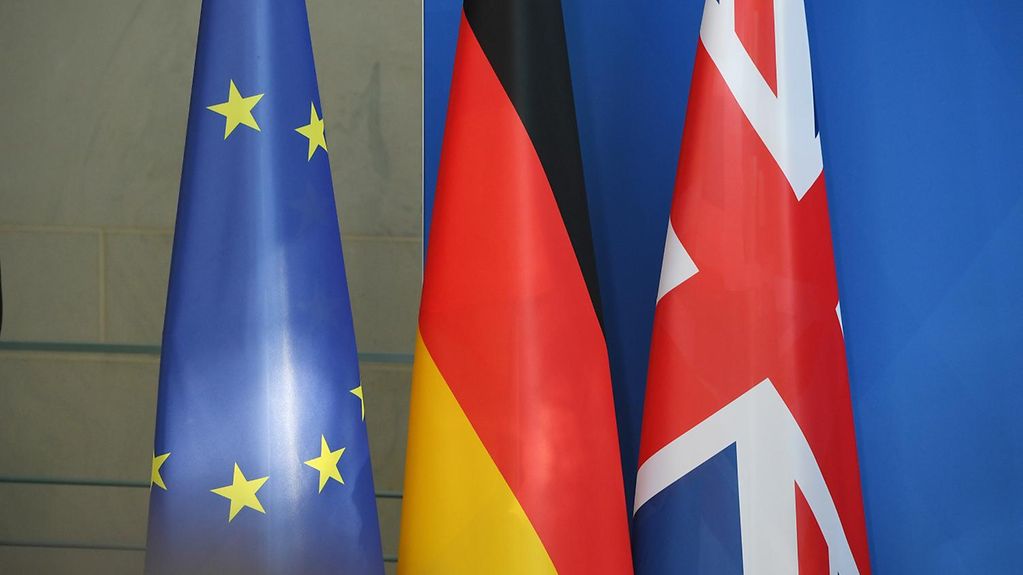Brexit
The Cabinet has adopted more bills to cushion the impact of Brexit. They include transitional labour and social insurance regulations. A Tax Accompanying Act is to protect companies in the financial sector from undesirable legal consequences and adverse impacts.
3 min reading time

Brexit is in sight: the UK is set to leave the European Union at the end of March 2019
Photo: picture alliance / dpa
The German government is counting on the orderly withdrawal of the United Kingdom from the European Union. At the same time, though, it is taking precautions in case it proves impossible to come to a comprehensive withdrawal agreement. Today’s Cabinet decisions are part of these preparations.
Social insurance will continue to apply
German citizens living and working in the UK and British citizens living and working in Germany on 30 March 2019 are to retain their social insurance protection: health insurance, nursing care insurance, unemployment insurance, old age pension insurance and accident insurance – even in the case of a no-deal Brexit.
The same applies to senior citizens living in the UK, and receiving a German pension.
The Cabinet has passed the necessary transitional regulations. The bill presented by the Federal Ministry of Labour and Social Affairs also includes transitional regulations on employment promotion, pre-retirement part-time working, and supply of temporary workers.
It stipulates that British trainees and students who have begun a course of training or a degree course in Germany, and vice versa will be able to complete their education. They will also be entitled to student loans under the BAföG scheme, even after 30 March 2019 in the case of a non-deal Brexit.
Where applications for naturalisation have been lodged but not decided prior to 30 March 2019, applicants will be entitled to retain their original citizenship in the case of a no-deal Brexit. They will be entitled to hold dual citizenship so ensure that they are not adversely affected by the length of time required to process their application. This is also covered by the draft legislation.
Avoiding adverse fiscal impacts on companies
The withdrawal of the United Kingdom from the EU will have consequences for companies, including businesses in the financial sector. To prevent any undesirable legal consequences or adverse impacts, the Cabinet has adopted a draft Brexit Tax Accompanying Act. It aims to ensure that Germany’s financial market will remain stable and that it can continue to operate.
The bill includes regulations in the fields of taxation, the financial market and labour law:
- Tax regulation are to prevent any disadvantages occurring retrospectively. In cases in which Brexit per se – without any action on the part of the tax-payer – results in an undesirable legal consequence, the tax-payer is to be protected from such adverse impacts.
- Should the United Kingdom leave the EU without a withdrawal agreement, the bill provides for financial market regulations, to prevent adverse impacts on the German business partners of British financial services companies.
- The bill also relaxes the protection against dismissal covering so-called ‘risk-bearers’ working for major banks. This is a special regulation for bankers whose fixed annual remuneration is three times as high as annual upper earning limit in the statutory pension insurance scheme. The protection against dismissal will remain unchanged for all other employees in the financial sector.
Prime Minister Theresa May visits Chancellor Angela Merkel
Following the decision of British Prime Minister Theresa May to postpone a planned vote on the withdrawal agreement in the House of Commons, she flew to European capitals on 11 December for further talks. The Chancellor was one of those who met with Theresa May to discuss the next steps.
Donald Tusk, President of the European Council, has also invited the EU-27 to discuss Brexit further on 13 December on the sidelines of the European Council meeting.
On 25 November 2018 the EU heads of state and government agreed on the withdrawal agreement and a political statement laying out the future relationship between the EU and the United Kingdom. Chancellor Angela Merkel said at that point, "In the view of the 27 member states a foundation is now in place for an orderly separation and for establishing future relations".
The withdrawal agreement must now be approved by the European Parliament – and of course by the UK parliament. The German Bundestag will be kept up to date with developments but is not required to approve the agreement.